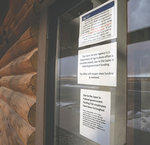Mostly Cloudy, 60° F
The partial shutdown of the federal government has affected many national parks and services in the Powell area. For some federal employees, it means being on furlough and living off savings, if …
This item is available in full to subscribers.
The Powell Tribune has expanded its online content. To continue reading, you will need to either log in to your subscriber account, or purchase a subscription.
If you are a current print subscriber, you can set up a free web account by clicking here.
If you already have a web account, but need to reset it, you can do so by clicking here.
If you would like to purchase a subscription click here.
Please log in to continue |
|



The partial shutdown of the federal government has affected many national parks and services in the Powell area. For some federal employees, it means being on furlough and living off savings, if available. Others are mandated to work without pay, still worrying about how to pay bills.
One example is the employees of the Transportation Safety Administration. While many National Park Service employees are on furlough, TSA workers are mandated to work their shifts. Neither group receives paychecks, but TSA employees, including those at Yellowstone Regional Airport in Cody and Logan International Airport in Billings, still have to bear the cost of commuting to work and long hours.
Calls to public information officers at the TSA are forwarded to an answering machine that says, “Due to the partial government shutdown, this line is not being monitored.”
There are 4,977 federal employees in Wyoming, according to the U.S. Office of Personel Management. Most work for the Department of Interior at national parks and agencies like the Bureau of Land Management. Others work for the U.S. Department of Agriculture or Department of Homeland Security, including the Transportation Security Agency.
Hundreds of TSA employees across the country have been calling in sick in a suspected protest of working without pay; union officials representing TSA workers have said they believe the protests are likely to increase as the shutdown continues. Others have cited the inability of the lower pay scale employees to afford childcare expenses or taking cash jobs to pay rent as reasons for the “sick out.”
No such protests have been reported in the airports in Cody and Billings.
National parks
At Yellowstone National Park, the gates are open for oversnow travel thanks to the park’s concessionaire, Xanterra Travel Collection, and dozens of businesses with commercial use permits. They’re all providing funding to keep the Park Service’s road crews working.
“If it weren’t for the donations, the interior of the park would be closed,” said Yellowstone spokesperson Jody Lyle.
Walkways aren’t being shoveled, but several restroom facilities are being cleaned by local volunteers, as the park operates on one-third of the usual winter staff, Lyle said. But Yellowstone is different from many National Park properties. Winter travel is limited and relatively few visitors make it to the park compared to millions who travel to the nation’s first national park in the summer.
“Life safety personnel (ambulances and law enforcement) are still working in case someone has a snowmobile accident or other emergencies,” Lyle said.
Law enforcement is busy in the park because some visitors assume the shutdown means there are no rules, Lyle said. Some have tried to enter the park on snowmachines not allowed under the park’s best available science rules. Others feel travel off of the groomed roads is allowed. Last year, during a brief shutdown, evidence was found of snowmobiles traveling on walkways at some of the park’s popular attractions.
“Despite the fact we’re technically closed, we’re still enforcing all the rules,” Lyle said.
Gary Fales Outfitting and Snowmobile Tours, which leads trips through the park’s East Entrance, reported a few calls inquiring if the company was still offering tours (it is), but business has otherwise been unaffected by the shutdown. One bonus for those on the tours: park rangers aren’t on duty to collect entry fees, so riders are saving the price of a daily entry into the park.
Save for essential positions, employees at the Bighorn Canyon National Recreation Area are all on furlough. While the park doesn’t charge admission and roads are still open, the shutdown affects planning for 2019 projects and has closed the visitor center in Lovell.
Not being able to work is frustrating, said Todd Johnson, a park ranger and Powell resident.
“I’m chomping at the bit to get back to work,” Johnson said last week. “I love my job,”
Other offices
Employees at the Natural Resources Conservation Services in Powell are still working and getting paid.
“We’re feeling really blessed to have a job,” said Rory Karhu, district conservationist.
The NRCS allocates their yearly budget through legislative allocations the previous years. Karhu said the office has enough in the budget to get through multiple pay periods before the shutdown would be an issue.
Should local NRCS employees go on furlough, it could shut down many construction projects that require frequent inspections. The agency will have to wait for reimbursement for expenses and general support costs, but it’s otherwise unaffected — as long as the shutdown doesn’t drag on for months, Karhu said.
However, employees at the Farm Services Administration, who share office space with the NRCS, are all on furlough.
On Friday, President Donald J. Trump said the shutdown could go on for “months or even years.” At issue is border security and billions of dollars of funding to build a wall along the southern border of the United States with Mexico.
The shutdown is the third longest in U.S. history. The longest shutdown (21 days) ran between Dec. 15, 1995 and Jan. 6, 1996, when Bill Clinton was president. The government shut down two other times in 2018, although the first lasted less than three days and the second shutdown persisted for just nine hours, with no federal employees furloughed. Since 1976, when Congress revised the budget process, the federal government has had 22 partial or full shutdowns after funding lapsed.